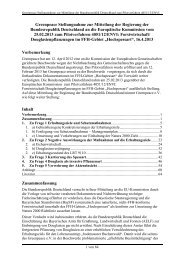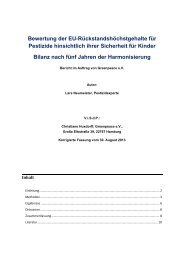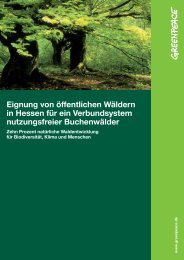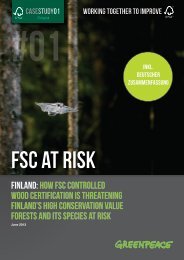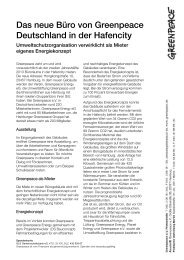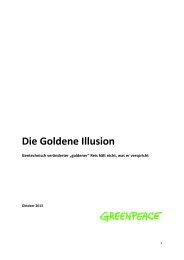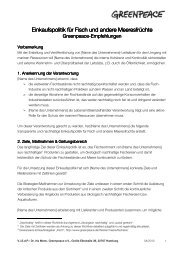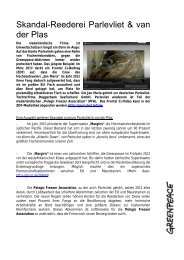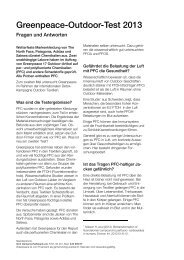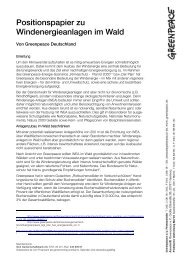Untitled - Greenpeace
Untitled - Greenpeace
Untitled - Greenpeace
Create successful ePaper yourself
Turn your PDF publications into a flip-book with our unique Google optimized e-Paper software.
26<br />
CARVING UP THE CONGO<br />
THE LEGAL REVIEW: WILL IT LAUNDER<br />
ILLEGAL TITLES AND LEAVE CORRUPTION<br />
UNCHALLENGED?<br />
The legal review is a crisis point for the World<br />
Bank, the DRC Government and the country’s<br />
rainforest – the future of more than 20 million<br />
hectares of forest hangs in the balance.<br />
The legal review is a crucial opportunity to<br />
stand up for good governance and the rule of<br />
law. A display of firm governance is urgently<br />
needed by cancelling forest contracts held by<br />
loggers who have gained control of the<br />
rainforest illegitimately, or whose operations<br />
support corruption or violate social and<br />
environmental laws.<br />
Unfortunately, however, the legal review looks<br />
set to reward corruption rather than tackle it,<br />
due to the weakness of the criteria against<br />
which it will assess the legitimacy of titles. The<br />
review will not look at the way titles were<br />
originally awarded – eg whether they were<br />
awarded during wartime, or whether bribery<br />
or other corrupt exchanges were involved –<br />
but merely at whether or not companies have<br />
complied with the terms of the contract<br />
agreed with the Ministry of Environment. New<br />
logging titles agreed with the Ministry of<br />
Environment after May 2002 ought to fail the<br />
legal review as they violate both the<br />
moratorium 125 and the Forestry Code.<br />
The review will assess legality in terms of<br />
compliance with a few very basic elements, 126<br />
the most important being the ‘legal validity of<br />
the title’ (ie that it was obtained in accordance<br />
with the correct procedures), ‘full payment of<br />
forest area fees since 2003’ (ie since the end<br />
of the war) and ‘complying with boundaries as<br />
defined by the contract and the topographical<br />
map attached to said contract’. 127 On various<br />
occasions in 2006, <strong>Greenpeace</strong> has sought<br />
clarification of the actual scope of the review<br />
from the appointed Independent Observer 128<br />
team overseeing the process (staffed by the<br />
World Resources Institute (WRI) and Agreco).<br />
They responded as follows:<br />
s Payment of taxes: Article 118 of the<br />
Forestry Code stipulates that ‘Any<br />
suspension of payment [of taxes] shall<br />
constitute ... a cause of forfeiture and result<br />
in the cancellation of the forest contract.’ 129<br />
<strong>Greenpeace</strong> suspects that retrospective<br />
payment will be deemed acceptable. In other<br />
words, legality will be bought retrospectively.<br />
The DRC Government has already been lax in<br />
enforcing the area tax. In 2004, for instance,<br />
according to a World Bank-led forestry sector<br />
review, 45% of area tax on logging titles was<br />
unpaid. 130 A DRC Ministry of Finance 2005 list<br />
of titles that had not paid tax in 2003-2004<br />
shows that of the contracts up for conversion<br />
that were signed prior to the moratorium, only<br />
about 40 did not appear on the list of<br />
defaulters during this period. 131 As of March<br />
2007, the definitive listing of tax payments<br />
2003-05 has still not been published. In the<br />
fourth report on its activities, the Independent<br />
Observer complains of significant<br />
discrepancies between documentation made<br />
available for review. 132<br />
s Compliance with boundaries: The<br />
Independent Observer agrees with<br />
<strong>Greenpeace</strong> that the ‘presence of infraction<br />
reports is an inadequate means of verifying



